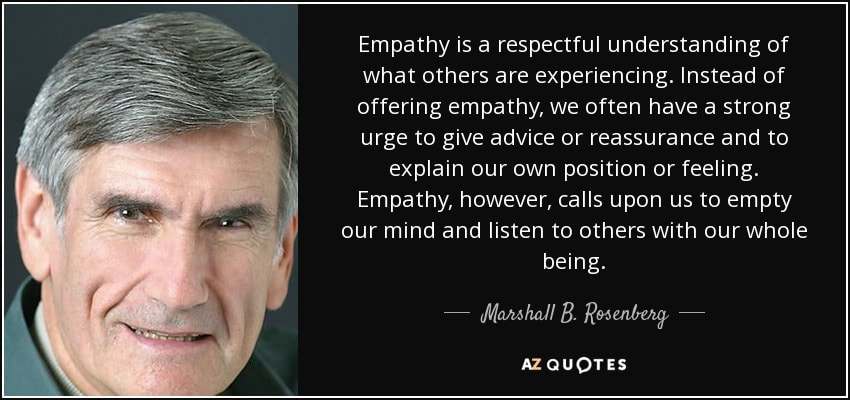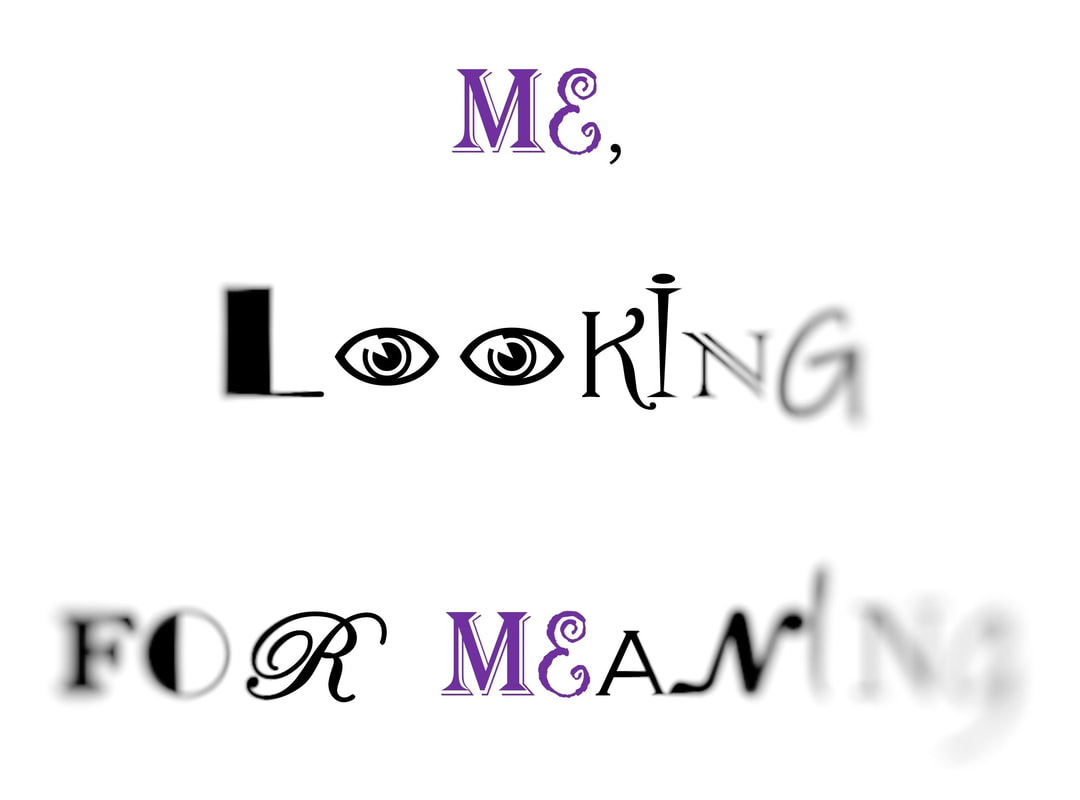Empathy
PAGE IN PROGRESS
What you see here is a page of my hypertext book Me, Looking for Meaning. Initially empty, it will slowly be filled with thoughts, notes, and quotes. One day, I will use them to write a coherent entry, similar to these completed pages. See this post to better understand my creative process. Thank you for your interest and patience! :)
What you see here is a page of my hypertext book Me, Looking for Meaning. Initially empty, it will slowly be filled with thoughts, notes, and quotes. One day, I will use them to write a coherent entry, similar to these completed pages. See this post to better understand my creative process. Thank you for your interest and patience! :)
Dark side of empathy: https://www.npr.org/sections/health-shots/2019/04/12/712682406/does-empathy-have-a-dark-side
commercializing empathy: https://www.youtube.com/watch?v=rD2nSd6kDQQ&ab_channel=AmicaInsurance
limitation of empathy: when it us understand as exclusive; inclusivity should extend to empathy.
One definition of empathy as an ability to see the logic of somebody else's perspective without embracing it.
According to another definition, empathy can be cognitive and emotional. Most people can experience both, and in fact do in some combination. Emotional empathy is when we feel somebody's emotion without fully comprehending it (somebody is crying and we feel sad). Cognitive empathy is when we understand why somebody feels a certain way (the logic of their perspective) without necessarily feeling the same emotion.
If a person A tells us: "I feel this way" but we don't feel the same way we them, an empathic response would be to try recalling when we were in a situation similar to what the person A is in now and recalling the feeling we felt. As a side note, Stanislavsky's method is based on the same idea as well.
Empathy towards others vs. self-empathy
Five-surprising facts about empathy: https://medium.com/@elizavetafriesem/five-surprising-facts-about-empathy-9246b39687b6
Empathy is not an easy problem-free skill, an ideal solution to all of the world's problem. I believe in the importance of empathy, but I also believe that it needs to be practiced correctly in order to be of any help.
Counterintuitively, our innate empathy can hurt others. Sometimes when we feel another person's pain, we turn our empathy off without realizing it in order to avoid the discomfort that empathy creates in us. This can explain desensitization (like growing thicker skin on soles of our feel if we walk barefoot a lot), a victim-blaming, which can be explained through just world theories.
People who experience traumatic events as children are more empathetic as adults: https://www.psypost.org/2018/11/people-who-experience-traumatic-events-as-children-are-more-empathetic-as-adults-52640
Using empathy is a matter of one's own self-preservation. When we fail to use empathy in a conflict situation, the conflict may get out of control.
We all think empathy is important
But many people think that empathy should be only practiced towards people who deserve empathy
If we are mad at somebody, we usually don’t think they deserve our empathy
Empathy can be very difficult to practice when we don’t think we should waste our time practicing it
Book "Lazy person's guide to empathy" - you cannot be lazy if you want to use empathy!
Empathy consulting
Empathicworkplace.com
Empathicconsulting.com
Moreempathy.com
Empathydesign.com
Theempathyguy.com (see his book)
Empathyinthecontextofphilosiphy.com
”The Rabbit Listened”
Brene Brown HBO series: you cannot empathize in a sense that you cannot feel/understand exactly what the other person is feeling.
Functional-aligned interventions in the classrooms are based on the idea that every behaviour serves a purpose.
Gage, N.A., Lewis, T.J., & Stichter, J.P. (2012). Functional behavioral assessment-based interventions for students with or at risk for emotional and/or behavioral disorders in school: A hierarchical linear modeling analysis. Behavioral Disorders, 37, 55-77.
Hershfeldt, P. A., Rosenberg, M. S., & Bradshaw, C. P. (2010). Function-based thinking: A systematic way of thinking about function and its role in changing student behavior problems. Beyond Behavior
Every repeated behavior has a purpose, which is considered the "function" of the behavior.
On the surface, it might make more sense to think about functions of socially expected/ accepted behaviors and positive coping strategies. However, all behaviors of concern also serve a purpose purposeful. Understanding its purpose requires cognitive empathy. We do not accept behavior in question, but we understand why it happens. It serve a purpose, it is not meaningless.
Scholars studying disruptive behaviour in the classroom note that it is important to recognize that such behaviors are somehow working for the student who engages in this behavior. There is a need that this behavior needs. As long as this need is present and not satisfied in a different way, the behavior of concern will be present. The way to eliminate the behavior of concern is not to punish the student but to teach them how they can satisfy their need in a different, less disruptive/harmful and more efficient way. The process of teaching this new behavior is called function-aligned intervention. It requires cognitive empathy, because in order to intervene we need to understand complex reasons for the behavior (underlying needs) instead of simply labeling the student as mean and/or stupid.
would it be fair to say that emotional empathy is easier for most people than congnitive empathy?
if you see someone cry, you will most likely be moved by that in some way (emotional empathy)
but if you hear someone’s explanation about how they feel, you might not be inclined to understand how they feel, especially when you are are in the midst of your own emotions
It is not easy to be kind: https://www.pbs.org/independentlens/blog/the-science-of-kindness-its-not-easy-being-nice/
Empathy is a skill that can change: https://www.ncbi.nlm.nih.gov/pmc/articles/PMC5513638/
to love others you need to love yourself; to understand others you need to understand yourself.
Epistemic empathy: https://kevindorst.substack.com/p/in-defense-of-epistemic-empathy?utm_medium=campaign&utm_content=miah
About this project: Start page
commercializing empathy: https://www.youtube.com/watch?v=rD2nSd6kDQQ&ab_channel=AmicaInsurance
limitation of empathy: when it us understand as exclusive; inclusivity should extend to empathy.
One definition of empathy as an ability to see the logic of somebody else's perspective without embracing it.
According to another definition, empathy can be cognitive and emotional. Most people can experience both, and in fact do in some combination. Emotional empathy is when we feel somebody's emotion without fully comprehending it (somebody is crying and we feel sad). Cognitive empathy is when we understand why somebody feels a certain way (the logic of their perspective) without necessarily feeling the same emotion.
If a person A tells us: "I feel this way" but we don't feel the same way we them, an empathic response would be to try recalling when we were in a situation similar to what the person A is in now and recalling the feeling we felt. As a side note, Stanislavsky's method is based on the same idea as well.
Empathy towards others vs. self-empathy
Five-surprising facts about empathy: https://medium.com/@elizavetafriesem/five-surprising-facts-about-empathy-9246b39687b6
Empathy is not an easy problem-free skill, an ideal solution to all of the world's problem. I believe in the importance of empathy, but I also believe that it needs to be practiced correctly in order to be of any help.
Counterintuitively, our innate empathy can hurt others. Sometimes when we feel another person's pain, we turn our empathy off without realizing it in order to avoid the discomfort that empathy creates in us. This can explain desensitization (like growing thicker skin on soles of our feel if we walk barefoot a lot), a victim-blaming, which can be explained through just world theories.
People who experience traumatic events as children are more empathetic as adults: https://www.psypost.org/2018/11/people-who-experience-traumatic-events-as-children-are-more-empathetic-as-adults-52640
Using empathy is a matter of one's own self-preservation. When we fail to use empathy in a conflict situation, the conflict may get out of control.
We all think empathy is important
But many people think that empathy should be only practiced towards people who deserve empathy
If we are mad at somebody, we usually don’t think they deserve our empathy
Empathy can be very difficult to practice when we don’t think we should waste our time practicing it
Book "Lazy person's guide to empathy" - you cannot be lazy if you want to use empathy!
Empathy consulting
Empathicworkplace.com
Empathicconsulting.com
Moreempathy.com
Empathydesign.com
Theempathyguy.com (see his book)
Empathyinthecontextofphilosiphy.com
”The Rabbit Listened”
Brene Brown HBO series: you cannot empathize in a sense that you cannot feel/understand exactly what the other person is feeling.
Functional-aligned interventions in the classrooms are based on the idea that every behaviour serves a purpose.
Gage, N.A., Lewis, T.J., & Stichter, J.P. (2012). Functional behavioral assessment-based interventions for students with or at risk for emotional and/or behavioral disorders in school: A hierarchical linear modeling analysis. Behavioral Disorders, 37, 55-77.
Hershfeldt, P. A., Rosenberg, M. S., & Bradshaw, C. P. (2010). Function-based thinking: A systematic way of thinking about function and its role in changing student behavior problems. Beyond Behavior
Every repeated behavior has a purpose, which is considered the "function" of the behavior.
On the surface, it might make more sense to think about functions of socially expected/ accepted behaviors and positive coping strategies. However, all behaviors of concern also serve a purpose purposeful. Understanding its purpose requires cognitive empathy. We do not accept behavior in question, but we understand why it happens. It serve a purpose, it is not meaningless.
Scholars studying disruptive behaviour in the classroom note that it is important to recognize that such behaviors are somehow working for the student who engages in this behavior. There is a need that this behavior needs. As long as this need is present and not satisfied in a different way, the behavior of concern will be present. The way to eliminate the behavior of concern is not to punish the student but to teach them how they can satisfy their need in a different, less disruptive/harmful and more efficient way. The process of teaching this new behavior is called function-aligned intervention. It requires cognitive empathy, because in order to intervene we need to understand complex reasons for the behavior (underlying needs) instead of simply labeling the student as mean and/or stupid.
would it be fair to say that emotional empathy is easier for most people than congnitive empathy?
if you see someone cry, you will most likely be moved by that in some way (emotional empathy)
but if you hear someone’s explanation about how they feel, you might not be inclined to understand how they feel, especially when you are are in the midst of your own emotions
It is not easy to be kind: https://www.pbs.org/independentlens/blog/the-science-of-kindness-its-not-easy-being-nice/
Empathy is a skill that can change: https://www.ncbi.nlm.nih.gov/pmc/articles/PMC5513638/
to love others you need to love yourself; to understand others you need to understand yourself.
Epistemic empathy: https://kevindorst.substack.com/p/in-defense-of-epistemic-empathy?utm_medium=campaign&utm_content=miah
About this project: Start page

